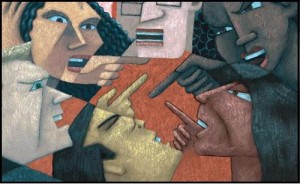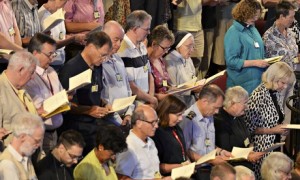
Under no circumstances should complaining be tolerated no matter what the reason. Anyone found complaining should be subjected to most severe punishment.
What to do with our complaints?
I had hoped that last week’s admission of personal struggle would be a one off occurrence but it seems I must continue to bear my burdens publicly this week. Before I do that I would like to to give testimony of God’s faithfulness in helping me work through the parts of my discipleship that I find difficult.
After writing my post on how much I resist the call to be less materialistic and to go out into mission with ‘no gold, or silver, or copper in [my] belts, no bag for [my] journey, or two tunics, or sandals, or a staff.’(Matthew 10:9-10a) I had a conversation with my wife. She encouraged me to name those things I am particularly connected to and discussed how they could be destroyed by fire or flood or theft and our response if that was the case. Aside from my books which I am still too possessive over I did find myself more open to letting stuff go and giving stuff away to the right person. He has helped me to look at my property in a different way and I continue to pray about my addiction to my books!
This week St. Benedict talks about the distribution of property and the same sentiment as the previous two chapters is discussed. He does, however, move his command onto a different ‘weakness’ and is equally severe towards it than he is to possession; grumbling, or to give it its proper term: ‘murmuring’.
Murmuring gives this sense of gossip rather than just a heartfelt objections to another (‘grumbling’). We’ve all been a victim to this, haven’t we? When, whether we would say it to their face if we were given a chance or not, we discuss someone else to our friends or confidantes behind their back. Murmuring is so contagious. If you are in a conversation with someone and they start to talk about an absent person it is hard to stop the conversation for they might, given time, speak well of them and you can rejoice in them but gossip hides itself behind ‘good will’, ‘concern’ and other worthy feelings. As a listener it is hard to not be drawn into commenting on them. Even if you pluck up the courage to name gossip the other person can easily say,
Oh, don’t get me wrong, I love them, but…
When we read St. Benedict’s severe rebuking of this practice of ‘grumbling’ it should show how gentle the Rule of St. Benedict is in comparison. These words on grumbling are so strong and firm that it surprise us that he takes it so seriously. Why?
Murmuring it seems is the start of much larger problems. I know this from experience! It is enjoyable to discuss people and share news and stories but it can quickly turn to judgement over them and then to pride in ourselves that we are ‘not like other people: thieves, rogues, adulterers’ (Luke 18:11) There is a reason, within the Christian community that Jesus sets up a way to deal with conflict and disagreements.
If another member of the church sins against you, go and point out the fault when the two of you are alone. If the member listens to you, you have regained that one. But if you are not listened to, take one or two others along with you, so that every word may be confirmed by the evidence of two or three witnesses. If the member refuses to listen to them, tell it to the church; and if the offender refuses to listen even to the church, let such a one be to you as a Gentile and a tax collector. Truly I tell you, whatever you bind on earth will be bound in heaven, and whatever you loose on earth will be loosed in heaven. Again, truly I tell you, if two of you agree on earth about anything you ask, it will be done for you by my Father in heaven. For where two or three are gathered in my name, I am there among them. (Matthew 18:15-20)
This is very present at the moment and I’m currently wrestling with this directly. Somethings that I’ve become aware of by studying this passage:
It is important to note that this approach to conflict is for within the church. We should not take this out of the Christian community and place upon non-Christians the yoke of Christ if they do not intend to carry it. We shouldn’t judge people by a standard they never intended to live by in the first place. So this is about challenging other disciples in how they are walking out their faith in order to encourage more faithful obedience to Christ.
In many ‘churches’ (and say it like that because the question of ‘what is a church?’ has become complicated in our context) it is not always clear as to who is a disciple of Christ and who isn’t. This is a much bigger topic than we can handle right now but it’s important to understand that Jesus’ words were being heard by a small group of people who needed to be clear as to whether they were a follower Jesus or not due to the persecution and cost that they would pay for being a Christ-disciple; in our day it is easy to say “I’m a Christian” even if it isn’t so easy to live it out. So because membership to the church now is so easy we cannot necessarily immediately bring out this process with grievances we have with another. Having said that, The principle of going and talking directly to another person and pointing out how they’ve hurt you is a healthy challenge to us all.
There’s also a challenge in this passage about whether the person has sinned against you or not. In my circumstance the person has hurt another member of our church so, if we are take this command at face value it should not bother me and I should leave it to the two people to sort our their own grievances. In practice this doesn’t work out as simply as that. Indeed I’m reminded of Paul’s understanding of the Body of Christ,
If one member suffers, all suffer together with it. (1 Corinthians 12: 26a)
A person’s actions, when known by other members of the Body of Christ, impacts others. We cannot, after hearing of sin claim ignorance and think nothing of it. I am torn, however, in my situation as to whether I am the right person to go to the other and point out their fault; is it any of my business? I’m challenged because their actions have hurt me and upset me and I am not at peace with them. Jesus does tell us, clearly,
So when you’re offering your gift at the altar, if you remember that your brother or sister has something against you, leave your gift there before the altar and go; first be reconciled to your brother or sister, and then come and offer your gift. (Matthew 5:23-24)
As it weighs heavy on my mind I cannot stay silent about my concern. People close to me ask how I am and I cannot speak of my burden as it would be making my complaint to the wrong person. The more I do not speak to the other more I’m needing to speak of it to others and so grumbling begins. It vents this desire to ease my concern by sharing it with others but it can never lead to true reconciliation without me voicing this complaint to the person who has wronged me or caused another member to suffer.
The final thing that I’ve been challenged on is how we should treat people who do not heed the Church’s teaching, whether that is the historical Church or the local expression of church (small group, house church, Christian community). Jesus suggests we treat them like ‘a Gentile and a tax collector’ and it is in this statement that we return to our reflections on excommunication. The practice of excommunication is not about pushing someone out into the wilderness to fend for themselves but it is a change of the nature of relationship with them. In this instance to treat someone like a Gentile and a tax collector is to look at the examples as to how Jesus treated Gentiles and tax collectors; of going out of his way to save them.
And as Jesus sat at dinner in the house, many tax collectors and sinners came and were sitting with him and his disciples. When the Pharisees saw this they said to his disciples, “Why does your teacher eat with tax collectors and sinners?”… “I have come to call not the righteous but sinners.” (Matthew 9:10-11,13b)
In our churches we already invite non-believers to sit and share in our worship and we ask no questions; we desire them to come to know the love of God and to respond by taking up His yoke and committing to the process of being transformed into his likeness through obedience to his teaching and the direction of the Holy Spirit: the same should be said for these people who wrong us and refuse to listen to the correction of the Christian community. Their position within the church will change and, if they are part of the teaching or guidance of the church then they will need to be removed and to be treated as those new to the church. We do not cut our relationship with them but we must acknowledge that they have shown, by their lack of repentance, that they need space in order to hear again the call of God upon their life.
Reflection
Grumbling, complaining and murmuring are rife within the Church. We indulge in this past time far too often and we do ourselves a great disservice. To put it more severely, we encourage more sin and division by participating in it and this is why St. Benedict is so strict on the punishment for it.
This is so much easier to say than to live out and I, personally, fall down regularly on it. I write all this with a very heavy heart and I am, during these times, regularly finding myself weeping at my part in the Church falling short of the glory of God. As I walk through a personal battle with it I’m praying that the Lord will have mercy on my weakness and strengthen me to resist the temptation. I pray for him to save me, a sinner, to heal me and to bring me to greater obedience to Him.
I pray also for wisdom for the whole Church to be bold enough to live out this challenge to face conflict in a healthy and Godly way. There are added complications in my current situation which I need insight to manoeuvre but I beg the Lord to walk this path with me that He would show me how all things are being reconciled in Him.
Forgiving Father, I ask that you would have mercy upon your Church. I pray that you would defend it against temptation and strengthen us to live out your gospel in our lives. I cry out to you, our Saviour, to lead us and grant us wisdom to walk the narrow way of your Kingdom.
Come, Lord Jesus.
 Who has the right to the land of Gaza and the West Bank? We could start by going into all the history and legalities over this issue. The use of words such as ownership can then be brought into question. Historical facts could then be muddied by interpretation of events and phrasings and then there’s the insurmountable obstacle of personal stories and the tangled web of historical violence from both sides.
Who has the right to the land of Gaza and the West Bank? We could start by going into all the history and legalities over this issue. The use of words such as ownership can then be brought into question. Historical facts could then be muddied by interpretation of events and phrasings and then there’s the insurmountable obstacle of personal stories and the tangled web of historical violence from both sides. Winning arguments is easy if you can just wear down your opponent and the easiest way to do that is keep moving the goal posts; re-define the terms of the argument until it gets too complicated and they get confused and worn out. You don’t need truth to do this; all you need is stamina and intelligence.
Winning arguments is easy if you can just wear down your opponent and the easiest way to do that is keep moving the goal posts; re-define the terms of the argument until it gets too complicated and they get confused and worn out. You don’t need truth to do this; all you need is stamina and intelligence. In November 2012 General Synod’s motion to vote female bishops failed, only just but enough. What was clear back then was that the debate had been established on the principle that there was an ‘us’ vs. ‘them’. The aim was not to discover wisdom but to ‘win’ at any cost. Both parties on the extremes didn’t seem to care how they would win just as long as they did. This week, however, the tone of the debate was not on winning points and persuasion but a genuine, heartfelt desire to seek wisdom and to trust one another. The debate stopped being about party politics but more about seeking genuine peace and wisdom only found in the Spirit of God.
In November 2012 General Synod’s motion to vote female bishops failed, only just but enough. What was clear back then was that the debate had been established on the principle that there was an ‘us’ vs. ‘them’. The aim was not to discover wisdom but to ‘win’ at any cost. Both parties on the extremes didn’t seem to care how they would win just as long as they did. This week, however, the tone of the debate was not on winning points and persuasion but a genuine, heartfelt desire to seek wisdom and to trust one another. The debate stopped being about party politics but more about seeking genuine peace and wisdom only found in the Spirit of God. To dismantle such a fence of division takes time, building trust and relationship something sadly lacking in our politics in this country. My very public critique of the Same Sex Marriage Bill was not based on some personal, moral judgement on homosexuality but on the way a decision was being sought. It was rushed. The lobbyists pressured opponents with the supposed lack of time and bullied people into making a response; to choose a side of the fence. Rather than taking the fences down they were happy to keep them there. People were forced off the fence onto one side or the other and it was all done by the manipulation of language. The same is being done with The Assisted Dying Bill.
To dismantle such a fence of division takes time, building trust and relationship something sadly lacking in our politics in this country. My very public critique of the Same Sex Marriage Bill was not based on some personal, moral judgement on homosexuality but on the way a decision was being sought. It was rushed. The lobbyists pressured opponents with the supposed lack of time and bullied people into making a response; to choose a side of the fence. Rather than taking the fences down they were happy to keep them there. People were forced off the fence onto one side or the other and it was all done by the manipulation of language. The same is being done with The Assisted Dying Bill.